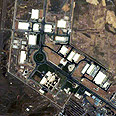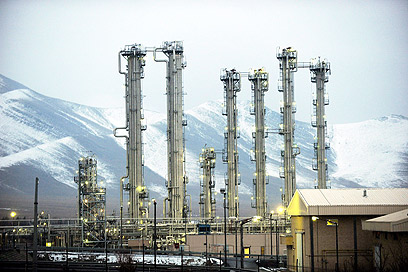
Iranian official presents '4-point plan' to end nuclear dispute
Ex-Iranian diplomat says Tehran should allow IAEA inspectors into atom facilities if West agrees to halt sanctions, recognize its right to uranium enrichment
WASHINGTON – The upcoming talks between Tehran and the West offer a prime opportunity to break the deadlock over Iran's nuclear program, a former Iranian negotiator said on Saturday.
In an op-ed published by The Boston Globe, Iranian scholar and former diplomat Hossein Mousavian asserted "war or coercion are not the only two options," proffering a three-step plan towards reaching a compromise between Tehran and the the five permanent members of the UN Security Council plus Germany (P5+1) next month.
Related articles:
- Clinton seeks tighter US-Gulf cooperation on Iran Panetta: Israel strike in Iran will engage US Report: Mossad cuts back on Iran operations
Mousavian served as spokesman for the Iranian nuclear talks in 2003-2005 and as foreign affairs advisor to Ali Larijani, Supreme National Security Council secretary between 2005 and 2007. He is currently a research scholar at Princeton University.
In his article, Mousavian notes a four-point plan which he says can resolve the Iranian nuclear dispute:
The first phase, he says, is "to cool down war-mongers. Iran should limit the extent to which it enriches uranium and should stop producing 20% enriched uranium.
"Simultaneously, the P5+1 should provide fuel rods for the Tehran Research Reactor, and the United States and EU should suspend sanctions on Iran’s oil and central bank."
The second phase would see Iran implement the "Subsidiary Arrangement Code 3.1" and the "Additional Protocol" – i.e. IAEA arrangements meant to ensure maximum levels of transparency – and address the UN nuclear watchdog's questions regarding its operations.
"The P5+1 should recognize Iran's right to nuclear energy under the Non-Proliferation Treaty, including enrichment (limited to civil, peaceful purposes) and suspend the UN nuclear-related sanctions," he said.

Iranian nucelar facility (Photo: EPA)
As part of the third phase, Mousavian continued, "Iran should permit the IAEA full surveillance of centrifuges and limit enrichment to existing sites. For a confidence-building period, it should get rid of nuclear fuel it isn't using for domestic consumption.
"In response, the P5+1 should suspend unilateral sanctions related to the nuclear issue, lift sanctions on civilian goods (such as aviation) and cooperate with Iran on peaceful nuclear technology."
The last, and fourth phase will entail securing sustainable transparency: "Iran should… maximize cooperation with the IAEA, and halt building further enrichment sites until IAEA ambiguities are removed. In return, the P5+1 should lift all UN and unilateral sanctions."
Meanwhile, the US and the EU continued to bolster sanctions against the Islamic Republic, and demand Tehran to engage in negotiations without preconditions. The upcoming round of talks has been scheduled to be held in Turkey next month.
US State Secretary Hillary Clinton, who took part in a Friends of Syria conference in Turkey, told Iranian reporters in Istanbul on Sunday that Tehran could demonstrate that its nuclear program has no military purpose by ending the production of 20% enriched uranium, shipping out such highly enriched uranium out of the country and opening up its facilities to constant inspections.
She confirmed that the powers will meet with Iranian delegates in two weeks, noting that the talks will not be "an open-ended discussion."
"This has to be a very serious action-oriented negotiation, where both sides are highly engaged on a sustainable basis to reach a decision that can be translated into policy that is verified as soon as possible," she said.
- Receive Ynetnews updates directly to your desktop










